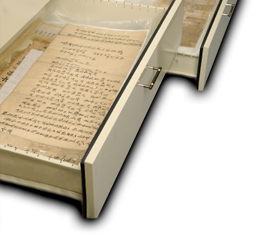|
(i) The Diary of Lin Xian-tang (1927-1955)
Lin Xian-tang (1881-1956), whose given name is Chao-chen, is also known by his pseudonym Guan-yuan. He was a leader of nationalist movements in Taiwan during the Japanese colonial period. He held the position of the chief of New People Society and a consultant for the Taiwanese People's Party. He also organized the Taiwan Local Autonomy League and was given the title of “Father of the Taiwan Congress.” During the February 28 Incident, Lin Xian-tang was holding the establishing ceremony for Chang Hwa Bank. Since he was receiving the director of the Ministry of Finance, Yen Chia-kan, Lin Xian-tang temporarily escaped from the chaos. However, he was later listed as “the leader of the rebellion” by the Kuomintang government. His diary written from 1947 to 1949 reflects the unstable situation in Taiwan and presents Lin Xian-tang’s thoughts about the incident and his deliberations over moving to Japan and never returning to Taiwan. (ii) The Diary of Wu Xin-rong (1933-1967)Wu Xin-rong (1907) was born in Yanshuigangting (now Jiangjun District in Tainan). After graduating from Tokyo Medical School in 1932, he returned to Tainan and practiced medicine in Jiali town, Tainan. After World War II, he actively attended local affairs related to literature and history. He played an active role in Taiwanese New Literature Movement and was praised as one of the seven representative authors in Beimen. Nevertheless, during the February 28 Incident, he was arrested because he joined the Beimen Chapter of the mediation committees. In 1954, he was sent to prison again because he was dragged into the “Lee Lu case.” His diaries reflect his remarkable life. He recorded his thoughts and perspectives during the February 28 Incident and the White Terror, documenting Taiwan history from an important perspective. In addition, Wu Xin-rong Papers in the Taiwan Archival Information System includes family photos and correspondence, revealing his daily life and interactions with his family. (iii) The Diary of Lu He-ruo (1942-1944)Lu He-ruo (1914-1950), whose given name was Shi-dui, was born in Tanzi, Taichung. He graduated from Taichung Normal School in 1934. He had been an editor of Taiwan Literature, and a journalist of Hsing-nan News. He had exceptional talents and performances in literature, drama, and music. He had intellectual aspirations for reforming the country, and first joined a young person’s organization founded by the Kuomintang (San-min Chu-i Youth Corps) after World War II. However, he was dragged into the February 28 Incident and forced to quit his job in Jianguo High School. In the late 1940s, he became a socialist and joined the Chinese Communist Party, became an editor of Guang-ming News. This shift in his political views shows how profoundly the February 28 Incident influenced him. From 1942 to 1944, the years in which he was most active, he left three diaries, recording his family and daily life, composing process, and interactions with people. These materials reveal his thoughts and perspectives. |
 |



